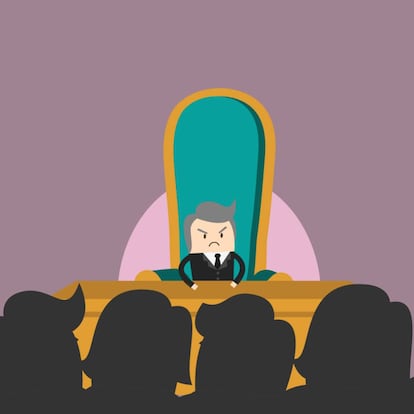How a position of power reveals someone’s true colors
Some people change as soon as they have responsibility because they are insecure

Henry Kissinger, former US secretary of state, was not known to be an adonis, but he was known for seduction. One day, he was asked how he’d managed to achieve his level of success and he responded with this immortal phrase: “Power is the ultimate aphrodisiac.” And that’s true. Power attracts people and becomes a drug, no matter how far up (or down) the food chain they may be. The problem is when power reveals who we really are.
Power is the ultimate aphrodisiac Henry Kissinger
It’s an opportunity to see what's behind the facade. When we have a position of power, we see our values and our insecurities. It is not even necessary to have a powerful position for this to happen. The passion for power lives in a myriad of places: a middle manager who enjoys control to the nth degree, the president of a regional association that acts like he is defending his life, or the club bouncer who doesn’t let people in for no good reason. That is, any position which involves a certain capacity for influence. That is why there are people who, when they have even just a little responsibility, are transformed – because insecurity and power can be an explosive combination. But beware, power itself is not inherently bad.
David McClelland, professor of psychology at Harvard, said that people have different motivations at work (and in life). There are those who enjoy achieving goals, others who seek to be part of a group, and there are people who are moved to influence third parties or have power. This last group can be classified into two separate groups: those who work for the common good and those who work for themselves at the expense of others. As is to be expected, the first group includes leaders or those who want to contribute positively, such as teachers, psychologists, politicians or bosses. In the second case, individualist power seekers put their interests before everyone else’s and wants to win at all costs.
When people are seduced by power, their motivation is usually their own personal values or insecurities
When people are seduced by power, their motivation is usually their own personal values (which leave more or less to be desired) or their personal insecurities, which is why they compensate with power. That is why it is not surprising that low self-esteem fosters individualistic power in bad bosses and managers. When they act this way for somewhat questionable values, there is little to do: change their position or get them out of the organization if possible. When their motivation is personal insecurity, it is better because there is room to maneuver.
Nobody is born a leader. Nobody is born an engineer, secretary or musician. Those skills can and should be learned. When you are promoted, just as you have to learn about the challenges of your new position, you also need to recognize and work on your insecurities, because if you do not, you may unconsciously embrace individualistic power and become authoritarian. Therefore, it is important that everyone who has a position of influence works on themselves, through training, development and sincere reflection. Only then can you achieve real leadership and reduce the chance of becoming addicted to power.
When you are promoted, you need to recognize and work on your insecurities
In short, if we want to feel good about ourselves, we need to ensure we do not focus too much on power, which can be as fleeting as success. We need to take the opportunity to analyze what happens when we let power go to our heads. Only then will it have been worth it.
English version by Debora Almeida.
Tu suscripción se está usando en otro dispositivo
¿Quieres añadir otro usuario a tu suscripción?
Si continúas leyendo en este dispositivo, no se podrá leer en el otro.
FlechaTu suscripción se está usando en otro dispositivo y solo puedes acceder a EL PAÍS desde un dispositivo a la vez.
Si quieres compartir tu cuenta, cambia tu suscripción a la modalidad Premium, así podrás añadir otro usuario. Cada uno accederá con su propia cuenta de email, lo que os permitirá personalizar vuestra experiencia en EL PAÍS.
¿Tienes una suscripción de empresa? Accede aquí para contratar más cuentas.
En el caso de no saber quién está usando tu cuenta, te recomendamos cambiar tu contraseña aquí.
Si decides continuar compartiendo tu cuenta, este mensaje se mostrará en tu dispositivo y en el de la otra persona que está usando tu cuenta de forma indefinida, afectando a tu experiencia de lectura. Puedes consultar aquí los términos y condiciones de la suscripción digital.








































